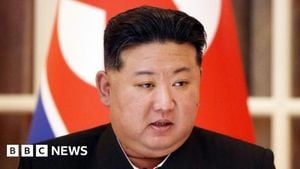In a dramatic turn of events that has gripped Argentina’s political landscape, President Javier Milei’s administration is now embroiled in a deepening corruption scandal that threatens to upend his already turbulent tenure. The crisis erupted after a series of leaked audio recordings surfaced, allegedly implicating some of the president’s closest advisers—including his own sister, Karina Milei—in a kickback scheme involving government health contracts and pharmaceutical companies.
The saga unfolded swiftly over the course of late August 2025. According to the Associated Press, on August 22, Argentine police, acting on orders from federal judge Sebastián Casanello, raided 15 luxury residences and offices in and around Buenos Aires. Among the targeted locations was the headquarters of the national agency for disability benefits, known as ANDIS. The scale of the operation was staggering: investigators seized accounting records, computers, cell phones, and boxes of files in a bid to uncover the breadth of the alleged wrongdoing. Notably, Diego Spagnuolo—President Milei’s personal lawyer and, until recently, the head of ANDIS—was found at a country club outside the capital, where police confiscated his mobile phone.
The investigation centers on audio recordings leaked to the media, which purportedly capture Spagnuolo describing a well-oiled kickback scheme. In the tapes, Spagnuolo alleges that pharmaceutical companies, most notably Suizo Argentina, paid bribes to secure lucrative government contracts for medications intended for disabled citizens. The money, he claims, was funneled up the chain to top officials, including Karina Milei, the president’s chief of staff, and her close confidant Eduardo “Lule” Menem. “They’re embezzling my agency. They’ve assigned a guy who handles everything related to my coffers,” Spagnuolo is heard saying in the recording, as reported by the Associated Press. He goes on to estimate, “Karina gets 3%. One percent goes to operations, another 1% goes to me... Probably something like that and they’re screwing you big time.”
While the government has not confirmed or denied the authenticity of the recordings, the fallout was immediate. President Milei’s administration dismissed Spagnuolo from his post on August 21, 2025, as the scandal dominated headlines and the opposition seized on the opportunity to demand accountability. In a statement, presidential spokesperson Manuel Adorni announced, “In light of the facts that are public knowledge and the opposition’s obvious political exploitation in an election year, the president has decided, as a preventive measure, to remove Diego Spagnuolo from his position.”
But the government’s efforts to contain the crisis did not stop there. According to national media and corroborated by La Nacion, ANDIS was promptly placed under trusteeship. Dr. Alejandro Alberto Vilches, an expert in health system management, was appointed as the new trustee, with his first mandate being a thorough audit of the agency—a move widely seen as an attempt to restore public trust and ensure accountability. Adorni emphasized the administration’s commitment to rooting out fraudulent practices, stating that Vilches’s appointment signaled a new era of transparency for the embattled agency.
The scandal has not only rocked the executive branch but has also reverberated through Argentina’s legislative corridors. Opposition figures, including Esteban Paulón and Leandro Santoro in the Chamber of Deputies, formally called for Spagnuolo’s interpellation, raising pointed questions about his conduct and the broader culture of corruption within government agencies. The case was initially brought to the courts by Gregorio Dalbón, attorney for former president and opposition leader Cristina Fernández de Kirchner, herself no stranger to corruption allegations and currently under house arrest following a Supreme Court ruling.
Federal prosecutor Franco Picardi has since launched an investigation to verify the authenticity of the recordings and to scrutinize the actions of all implicated officials. Judge Casanello, already overseeing the sweeping raids, now holds the fate of the case in his hands as legal proceedings move forward. The scope of the inquiry is broad: investigators are looking into possible charges of fraud, bribery, and conflict-of-interest negotiations, with early reports suggesting that officials could have netted between $20,000 to $30,000 each month through inflated medication prices and improper contracts.
The details of the audio recordings themselves remain murky. The conversations were apparently recorded in secret, with Spagnuolo’s voice the only one clearly identified amidst the ambient clatter of cutlery and coffee cups—hinting that the meeting may have taken place in a public café. The precise date and context of the recording are still unknown, but the content has been enough to spark a political firestorm.
This is not the first time Milei’s inner circle has been dogged by allegations of impropriety. Earlier in his presidency, Milei faced a scandal after publicly promoting an obscure cryptocurrency token called $LIBRA, which soared in value following his endorsement only to collapse soon after. The incident led to dozens of criminal complaints alleging fraud, reaching as far as New York City. Yet, the current crisis is arguably more damaging, striking at the heart of Milei’s promise to bring a new era of honesty and austerity to Argentine politics.
Complicating matters are the political stakes. The scandal broke just weeks ahead of Argentina’s crucial midterm elections, seen as a referendum on Milei’s radical libertarian agenda and his efforts to rein in public spending. The opposition-controlled lower house of Congress has already moved to overturn Milei’s veto of a spending bill that would increase benefits for people with disabilities—a move the president argues would jeopardize his pledge to balance the national budget. Negotiations are now underway in the Senate, where the government is working feverishly to prevent an override that could further undermine its authority.
As the story continues to unfold, the Milei administration faces a daunting challenge: how to navigate the fallout from this scandal while maintaining public confidence in its commitment to transparency and reform. All eyes are now on the ongoing judicial investigations and the government’s next moves. Will the administration’s swift action and promises of reform be enough to restore trust? Or will the revelations of alleged corruption at the highest levels prove too damaging to overcome?
For now, Argentina watches and waits, as the fate of its leadership—and the integrity of its institutions—hangs in the balance.




